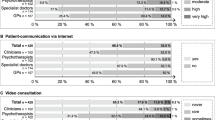Abstract
To improve Information Communication Technology for Development (ICT4D) in e-health applications means getting the maximum advantage at the minimum cost to purveyors and consumers. This is a conceptual and empirical paper arguing three informed decision points, taken in order, should happen whenever maximizing advantages of health diagnostics and/or treatment facilitation via online platforms. Three kinds of data are important to know beforehand to create informed decisions to maximize beneficial uses of online technology to aid mental health: (1) how do you define the etiology of mental health problems; (2) how do you define who should be helped as a priority, and (3) how do you make decisions technically to fit the former two points? Since serving patients is more important than technical profiteering, these three critical decision points mean primary medical choices of diagnosis and secondary social demographic research should guide a more conditioned tertiary technical use, instead of vice versa that regularly leads to cutting patients to fit a pre-determined and thus misaligned technological investment. Due to limitations of space, only the third vetting point is analyzed in detail. The current state of the art for how to reach patients best via Internet-connected technologies for monitoring and treating depression and schizophrenia is analyzed. Policy advice on platform design is given from this vetting procedure that might later be scaled worldwide.
Access this chapter
Tax calculation will be finalised at checkout
Purchases are for personal use only
Similar content being viewed by others
Notes
- 1.
This research was supported under the National Research Foundation (NRF) Korea (2020K1A3A1A68093469) funded by the Ministry of Science and ICT (MSIT) Korea and by the Department of Biotechnology (India) (DBT/IC-12031(22)-ICD-DBT).
References
Hammond, T., Lampe, L., Campbell, A., Perisic, S., Brakoulias, V.: Psychoeducational social anxiety mobile apps: systematic search in app stores, content analysis, and evaluation. JMIR Mhealth Uhealth 9(9), e26603 (2021). https://mhealth.jmir.org/2021/9/e26603. https://doi.org/10.2196/26603
Stoyanov, S., Hides, L., Kavanagh, D., Zelenko, O., Tjondronegoro, D., Mani, M.: Mobile app rating scale: a new tool for assessing the quality of health mobile apps. JMIR Mhealth Uhealth 3(1), e27 (2015). https://mhealth.jmir.org/2015/1/e27. https://doi.org/10.2196/mhealth.3422
Alexander, B.: The Globalisation of Addiction: A Study in Poverty of the Spirit. Oxford University Press, Oxford (2008)
Szasz, T.: Ceremonial Chemistry: The Ritual Persecution of Drugs, Addicts, and Pushers. Syracuse University Press, Syracuse, New York. Reprint. (2003/1974)
Whitaker, M.D., Brown, S.: Is mobile addiction a unique addiction: findings from an international sample of university students. Int. J. Ment. Health Addict. 18(5), 1360–1388 (2019). https://doi.org/10.1007/s11469-019-00155-5
Brown, E.R.: Rockefeller Medicine Men: Medicine and Capitalism in America. University of California Press, Berkeley (1980)
Wilkinson, R., Pickett, K.: The Spirit Level: Why Greater Equality Makes Societies Stronger. Bloomsbury Publishing. Revised and Updated Edition (2011)
Pellow, D.N.: Environmental racism: inequality in a toxic world (chap. 7). In: Romero, M., Margolis, E. (eds.) The Blackwell Companion to Social Inequalities, pp. 147–164. Blackwell Publishing, Ltd., (2005)
By editor’s recommendation, raw data in appendices are at an external link: http://mega.nz/file/kwZBhIib#lnhIwRs34NcK86KpR34_CAOXycopLOUUgvCQMF3wxiE
International Medical Device Regulators Forum SaMD Working Group: Software as a Medical Device (SaMD): Key Definitions, International Medical Device Regulators Forum (IMDRF), p. 6 (2013). http://www.imdrf.org/docs/imdrf/final/technical/imdrf-tech-131209-samd-key-definitions-140901.pdf
US Food and Drug Administration (US FDA): FDA Definition on SaMD. https://www.fda.gov/medical-devices/digital-health-center-excellence/software-medical-device-samd. (Unk.)
Bell, I.H., Lim, M.H., Rossell, S.L., Thomas, N.: Ecological momentary assessment and intervention in the treatment of psychotic disorders: a systematic review. Psychiatric Serv. 68(11), 1172–1181 (2017). https://ps.psychiatryonline.org/doi/10.1176/appi.ps.201600523
Baldwin, D.S., Birsistle, J.: An Atlas of Depression (The Encyclopedia of Visual Medicine Series), p. 7. The Parthenon Publishing Group, A CRC Press Company, London, U.K. (2002)
Baldwin, D.S., Birsistle, J.: An Atlas of Depression (The Encyclopedia of Visual Medicine Series), p. 60. The Parthenon Publishing Group, A CRC Press Company, London, U.K. (Chart Adapted from The functioning and well-being of depressed patients. Results from the Medical Outcomes Study. JAMA 262, 914–919 (2002)
Huckvale, K., Venkatesh, S., Christensen, H.: Toward clinical digital phenotyping: a timely opportunity to consider purpose, quality, and safety. NPJ Digit. Med. 2(1) (2019). https://doi.org/10.1038/s41746-019-0166-1
Thomas, N., et al.: Potential applications of digital technology in assessment, treatment, and self-help for hallucinations. Schizophr. Bull. 45(1), S32–S42, (2019), https://academic.oup.com/schizophreniabulletin/article/45/Supplement_1/S32/5305655#130300402. https://doi.org/10.1093/schbul/sby103
Author information
Authors and Affiliations
Corresponding author
Editor information
Editors and Affiliations
Appendices
Appendices
By the editor’s recommendation, appendices are at an external link or by contacting the authors since the appendices are not crucial for describing results of this study, though are raw data in the interests of transparency demonstrating empirical points already summarized in this paper: https://mega.nz/file/kwZBhIib#lnhIwRs34NcK86KpR34_CAOXycopLOUUgvCQMF3wxiE.
Rights and permissions
Copyright information
© 2022 Springer Nature Switzerland AG
About this paper
Cite this paper
Whitaker, M.D., Hwang, N., Usmonova, D., Cho, K., Park, N. (2022). Three Decision Points Vetting a More Ideal Online Technical Platform for Monitoring and Treating Mental Health Problems like Depression and Schizophrenia. In: Kim, JH., Singh, M., Khan, J., Tiwary, U.S., Sur, M., Singh, D. (eds) Intelligent Human Computer Interaction. IHCI 2021. Lecture Notes in Computer Science, vol 13184. Springer, Cham. https://doi.org/10.1007/978-3-030-98404-5_8
Download citation
DOI: https://doi.org/10.1007/978-3-030-98404-5_8
Published:
Publisher Name: Springer, Cham
Print ISBN: 978-3-030-98403-8
Online ISBN: 978-3-030-98404-5
eBook Packages: Computer ScienceComputer Science (R0)



